In a year of wild tech stories that has seen Elon Musk transform Twitter, cryptocurrency exchange FTX collapse and Silicon Valley Bank implode, this week’s whiplash-inducing turmoil at OpenAI is among the most captivating.
Sam Altman — the leader of one of the world’s most influential AI companies, OpenAI, and perhaps the most visible figure in the fledgling industry — was fired Friday night by the startup’s directors in a surprise move. Less than five days later, he’s back as the company’s CEO, now with a board that is, in theory, more supportive of his vision.
The series of extraordinary events unfolded just days after OpenAI held its first-ever developer conference, where it laid out new, commercialized versions of its technology, including the option to customize its ChatGPT AI chatbot.
If you’re just catching up, here’s what you missed from a week so incredible you’d be forgiven for thinking the script could have been written by an early version of OpenAI’s ChatGPT.
Friday
Around 3 p.m. ET, Altman joined a Google Meet call with most of OpenAI’s board that had been convened by fellow co-founder and OpenAI chief scientist Ilya Sutskever, during which Altman was fired and told that the news would soon be made public.
Within the next half hour, the board also informed Greg Brockman, another co-founder and OpenAI president, that he would be removed from the board.
Around 3:30 p.m. ET, OpenAI publicly announced that it had fired Altman over concerns that he was not always truthful with the board. The board said Mira Murati, the company’s chief technology officer, would become interim CEO.
OpenAI’s strategic partners, including its biggest financial backer Microsoft, were also reportedly informed of Altman’s ouster just minutes before the board’s announcement.
Hours after being fired, Altman posted on X that he “loved working with such talented people” and that he would have “more to say about what’s next later.”
Brockman promptly quit. “Please don’t spend any time being concerned. We will be fine,” Brockman said in a Friday post on X. “Greater things coming soon.”
A key factor in the CEO’s firing was tension between Altman, who favored developing AI more aggressively, and members of the OpenAI board, who wanted to move more cautiously, according to CNN contributor Kara Swisher, who spoke to sources knowledgeable about the unfolding events.

Saturday
Within 24 hours of Altman being fired, reports emerged that he and other ex-OpenAI loyalists were mulling plans for their own venture.
OpenAI’s board was also reportedly having second thoughts and considering asking the ousted CEO to return.
Sunday
By Sunday afternoon, Altman was back at OpenAI’s headquarters — this time with a guest badge — to negotiate his potential return. Microsoft CEO Satya Nadella reportedly mediated the discussion. A 5 p.m. PT deadline was reportedly set for the board to agree to Altman’s demands, including adding a seat for Microsoft, and reinstating him as CEO.
But those talks broke down.
As Sunday turned into Monday, Nadella tweeted that Altman, along with Brockman, would join Microsoft to run a new AI research group. At OpenAI, the group found a new interim CEO: Emmett Shear, the former CEO of Amazon’s streaming service, Twitch. Murati would return to her role as OpenAI’s chief technology officer.
Monday
In a post on X early Monday, Shear, who left his role at Twitch in March, described the chance to join OpenAI as “a once-in-a-lifetime” opportunity. He added that the company would hire an independent investigator to report on what happened in the lead-up to Altman’s firing.
But OpenAI employees were not convinced. More than 500 staffers signed an open letter calling on the company’s board to resign and reinstate Altman and Brockman. They also threatened to follow the co-founders to Microsoft if their demands were not met.
Altman posted on X, saying, “we have more unity and commitment and focus than ever before. we are all going to work together some way or other, and i’m so excited. one team, one mission.”
The drama was far from over. The Verge reported Monday afternoon that Altman and Brockman could still return to OpenAI if the board members who fired him resign.
And Nadella, speaking to CNBC, said he was “open to both options” when asked whether Altman would actually join Microsoft.
“Look, that is for the OpenAI board and management and the employees to choose,” Nadella said. “We chose to explicitly partner with OpenAI and we want to continue to do so, and obviously, that depends on the people of OpenAI staying there or coming to Microsoft.”

Tuesday
Altman was reinstated late Tuesday as OpenAI’s CEO, the company said on X.
“We have reached an agreement in principle for Sam Altman to return to OpenAI as CEO with a new initial board,” the company said, adding that the board will be chaired by Bret Taylor, a former co-CEO of Salesforce. Former Treasury Secretary Larry Summers will also join the board, alongside existing director, Quora CEO Adam D’Angelo.
“We are collaborating to figure out the details,” it said.
In his own post on X, formerly Twitter, Altman wrote that he is “looking forward” to returning to OpenAI and building on the firm’s “strong partnership” with Microsoft.
It’s unclear how Shear will be affected by Altman’s return. Posting on X, Shear wrote: “I am deeply pleased by this result, after (some) 72 very intense hours of work … I’m glad to have been a part of the solution.”
Brockman is also returning to OpenAI, according to his post on X.
Ultimately, Microsoft and Altman appear to be the big winners from the dust-up: Altman will continue leading the firm he helped to found. And Microsoft has wrested more control over the company it has backed with billions to bolster its ambitions in developing AI.
“We are encouraged by the changes to the OpenAI board,” Nadella said on X. “We believe this is a first essential step on a path to more stable, well-informed, and effective governance.”







